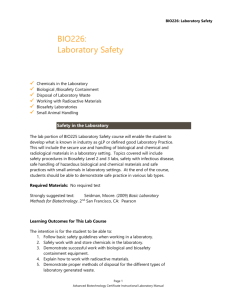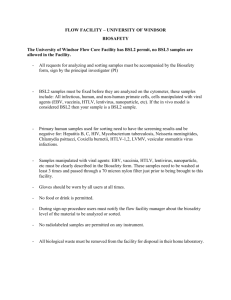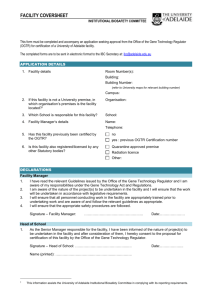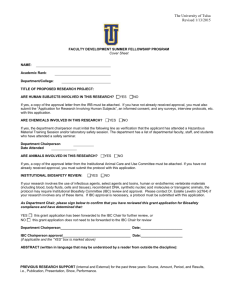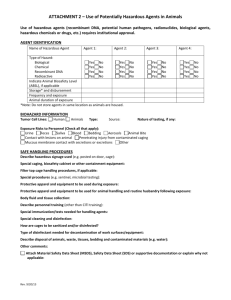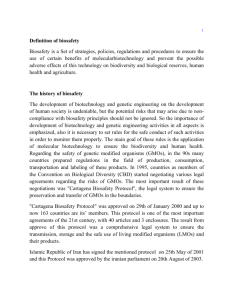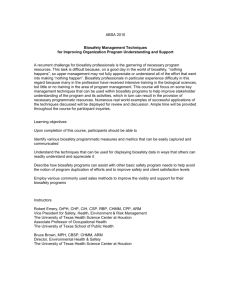EHSE Biosafety Committee Terms of Reference
advertisement
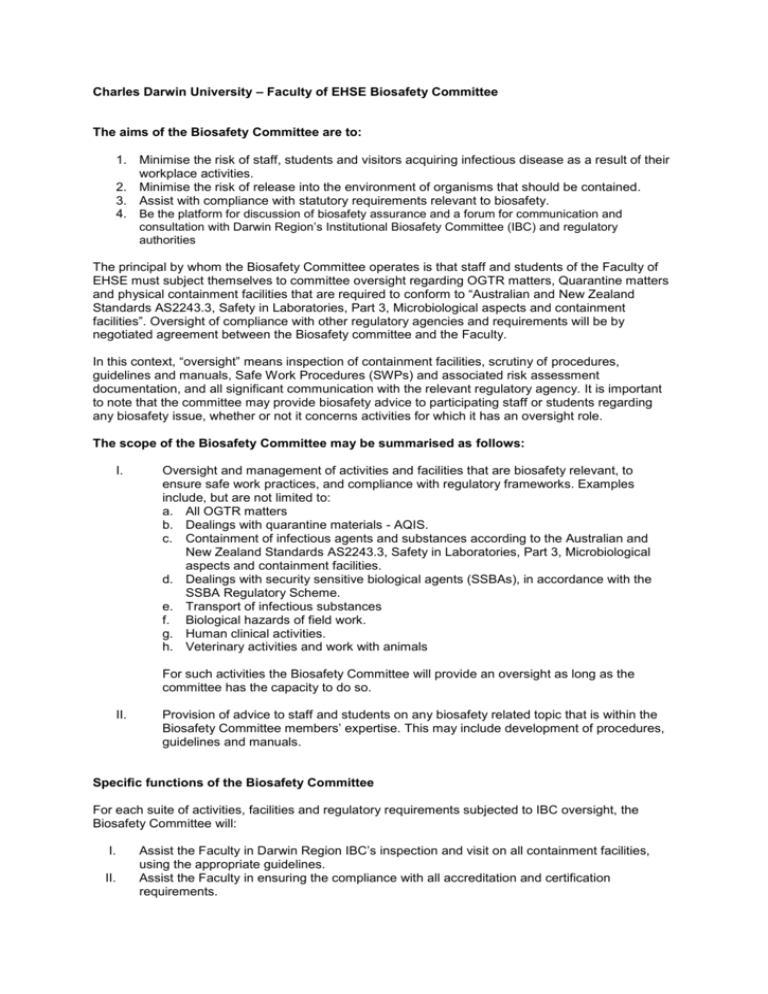
Charles Darwin University – Faculty of EHSE Biosafety Committee The aims of the Biosafety Committee are to: 1. Minimise the risk of staff, students and visitors acquiring infectious disease as a result of their workplace activities. 2. Minimise the risk of release into the environment of organisms that should be contained. 3. Assist with compliance with statutory requirements relevant to biosafety. 4. Be the platform for discussion of biosafety assurance and a forum for communication and consultation with Darwin Region’s Institutional Biosafety Committee (IBC) and regulatory authorities The principal by whom the Biosafety Committee operates is that staff and students of the Faculty of EHSE must subject themselves to committee oversight regarding OGTR matters, Quarantine matters and physical containment facilities that are required to conform to “Australian and New Zealand Standards AS2243.3, Safety in Laboratories, Part 3, Microbiological aspects and containment facilities”. Oversight of compliance with other regulatory agencies and requirements will be by negotiated agreement between the Biosafety committee and the Faculty. In this context, “oversight” means inspection of containment facilities, scrutiny of procedures, guidelines and manuals, Safe Work Procedures (SWPs) and associated risk assessment documentation, and all significant communication with the relevant regulatory agency. It is important to note that the committee may provide biosafety advice to participating staff or students regarding any biosafety issue, whether or not it concerns activities for which it has an oversight role. The scope of the Biosafety Committee may be summarised as follows: I. Oversight and management of activities and facilities that are biosafety relevant, to ensure safe work practices, and compliance with regulatory frameworks. Examples include, but are not limited to: a. All OGTR matters b. Dealings with quarantine materials - AQIS. c. Containment of infectious agents and substances according to the Australian and New Zealand Standards AS2243.3, Safety in Laboratories, Part 3, Microbiological aspects and containment facilities. d. Dealings with security sensitive biological agents (SSBAs), in accordance with the SSBA Regulatory Scheme. e. Transport of infectious substances f. Biological hazards of field work. g. Human clinical activities. h. Veterinary activities and work with animals For such activities the Biosafety Committee will provide an oversight as long as the committee has the capacity to do so. II. Provision of advice to staff and students on any biosafety related topic that is within the Biosafety Committee members’ expertise. This may include development of procedures, guidelines and manuals. Specific functions of the Biosafety Committee For each suite of activities, facilities and regulatory requirements subjected to IBC oversight, the Biosafety Committee will: I. II. Assist the Faculty in Darwin Region IBC’s inspection and visit on all containment facilities, using the appropriate guidelines. Assist the Faculty in ensuring the compliance with all accreditation and certification requirements. III. IV. V. VI. VII. VIII. IX. Assist the Faculty in ensuring that all activities are approved using processes specified by or acceptable to regulatory agencies. Carry out all significant communication with regulatory agencies Provide a scrutiny and approval process for Safe Work Procedures, Risk Assessments and Service/Maintenance relevant to the activities and facilities subject to oversight, and maintain records of these documents and the staff responsible for their implementation. Provide a scrutiny and approval process for staff and student induction and training practices. Develop of procedures, guidelines and manuals to assist in the management of biosafety within the Faculty. Provide advice regarding the construction of new containment facilities. Upon request and where qualified, provide advice to participating staff regarding other biosafety-relevant matters. This will be on an ad hoc basis. Membership The membership will conform to the requirements of the IBC and OGTR, and also be consistent with Australian and New Zealand Standards 2243.3. This would be expected to include: Chairperson A member with expertise in microbiology A member with expertise in dealings with genetically modified organisms. At least one member from research (academic) with expertise in microbiology/genetics At least one member who is teaching (academic) with expertise in microbiology/genetics At least one representative from Technical Services Group QC2 Facility Manager – AQIS Note: 1. Members can fulfil multiple roles. 2. One member of this committee must be identified as the nominated CDU representative for Darwin Region IBC and OGTR contact person 3. Other persons may be asked to participate in this committee in order to provide needed expertise, on an ad hoc basis Reporting The Committee will report: 1. All OGTR matters to the Darwin Region’s Institutional Biosafety Committee (IBC) through the nominated CDU representative. 2. All Quarantine matters to the Department of Agriculture, Fisheries and Forestry (DAFF) through the AQIS Facility Manager. 3. Meeting minutes to Faculty of EHSE Workplace Health and Safety Committee Copies of reports will be provided to: 1. Relevant regulatory bodies – only as required or requested by the regulator 2. Heads of CDU Departments, Faculties, Schools - only as required or requested 3. Chair of Faculty of EHSE Workplace Health and Safety committee Meeting Frequency The Committee will meet at least 4 times a year. The interval between meetings must not exceed 3 months. Out of session – matters may be resolved outside of the normal scheduled meetings. All correspondence and decisions taken relating to out of session actions are to be tabled at the next scheduled meeting. Consensus must have been reached on the matter or the issue held over for the next scheduled meeting for discussion by members. Rules A quorum will consist of at least 50% of the committee. One member apart from the Chair will be appointed deputy Chairperson, and will chair meetings when the chairperson is unavailable or has a conflict of interest. Other rules for the conduct of meetings, keeping of records and arriving at decisions will be in accordance with Charles Darwin University’s policy and procedures.
